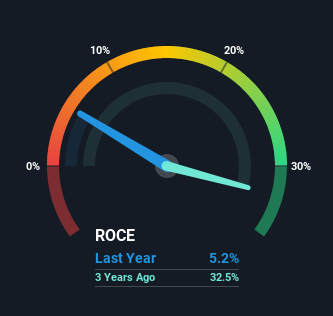Narnia (Hong Kong) Group (HKG:8607) Could Be Struggling To Allocate Capital
What trends should we look for it we want to identify stocks that can multiply in value over the long term? Amongst other things, we'll want to see two things; firstly, a growing return on capital employed (ROCE) and secondly, an expansion in the company's amount of capital employed. This shows us that it's a compounding machine, able to continually reinvest its earnings back into the business and generate higher returns. In light of that, when we looked at Narnia (Hong Kong) Group (HKG:8607) and its ROCE trend, we weren't exactly thrilled.
Return On Capital Employed (ROCE): What is it?
If you haven't worked with ROCE before, it measures the 'return' (pre-tax profit) a company generates from capital employed in its business. To calculate this metric for Narnia (Hong Kong) Group, this is the formula:
Return on Capital Employed = Earnings Before Interest and Tax (EBIT) ÷ (Total Assets - Current Liabilities)
0.052 = CN¥10.0m ÷ (CN¥327m - CN¥135m) (Based on the trailing twelve months to June 2021).
So, Narnia (Hong Kong) Group has an ROCE of 5.2%. Ultimately, that's a low return and it under-performs the Luxury industry average of 6.7%.
Check out our latest analysis for Narnia (Hong Kong) Group

While the past is not representative of the future, it can be helpful to know how a company has performed historically, which is why we have this chart above. If you'd like to look at how Narnia (Hong Kong) Group has performed in the past in other metrics, you can view this free graph of past earnings, revenue and cash flow.
What Can We Tell From Narnia (Hong Kong) Group's ROCE Trend?
When we looked at the ROCE trend at Narnia (Hong Kong) Group, we didn't gain much confidence. Around four years ago the returns on capital were 25%, but since then they've fallen to 5.2%. However, given capital employed and revenue have both increased it appears that the business is currently pursuing growth, at the consequence of short term returns. And if the increased capital generates additional returns, the business, and thus shareholders, will benefit in the long run.
On a related note, Narnia (Hong Kong) Group has decreased its current liabilities to 41% of total assets. That could partly explain why the ROCE has dropped. Effectively this means their suppliers or short-term creditors are funding less of the business, which reduces some elements of risk. Some would claim this reduces the business' efficiency at generating ROCE since it is now funding more of the operations with its own money. Keep in mind 41% is still pretty high, so those risks are still somewhat prevalent.
In Conclusion...
Even though returns on capital have fallen in the short term, we find it promising that revenue and capital employed have both increased for Narnia (Hong Kong) Group. These growth trends haven't led to growth returns though, since the stock has fallen 17% over the last year. As a result, we'd recommend researching this stock further to uncover what other fundamentals of the business can show us.
If you'd like to know more about Narnia (Hong Kong) Group, we've spotted 5 warning signs, and 1 of them is concerning.
While Narnia (Hong Kong) Group isn't earning the highest return, check out this free list of companies that are earning high returns on equity with solid balance sheets.
If you're looking for stocks to buy, use the lowest-cost* platform that is rated #1 Overall by Barron’s, Interactive Brokers. Trade stocks, options, futures, forex, bonds and funds on 135 markets, all from a single integrated account. Promoted
Valuation is complex, but we're here to simplify it.
Discover if Narnia (Hong Kong) Group might be undervalued or overvalued with our detailed analysis, featuring fair value estimates, potential risks, dividends, insider trades, and its financial condition.
Access Free AnalysisThis article by Simply Wall St is general in nature. We provide commentary based on historical data and analyst forecasts only using an unbiased methodology and our articles are not intended to be financial advice. It does not constitute a recommendation to buy or sell any stock, and does not take account of your objectives, or your financial situation. We aim to bring you long-term focused analysis driven by fundamental data. Note that our analysis may not factor in the latest price-sensitive company announcements or qualitative material. Simply Wall St has no position in any stocks mentioned.
*Interactive Brokers Rated Lowest Cost Broker by StockBrokers.com Annual Online Review 2020
Have feedback on this article? Concerned about the content? Get in touch with us directly. Alternatively, email editorial-team (at) simplywallst.com.
About SEHK:8607
Narnia (Hong Kong) Group
An investment holding company, manufactures and sells fabrics in Mainland China, Hong Kong, the United Arab Emirates, Egypt, Brazil, and internationally.
Mediocre balance sheet and slightly overvalued.
Market Insights
Weekly Picks


Crazy Undervalued 42 Baggers Silver Play (Active & Running Mine)


Fiducian: Compliance Clouds or Value Opportunity?

Willamette Valley Vineyards (WVVI): Not-So-Great Value
Recently Updated Narratives


The "Molecular Pencil": Why Beam's Technology is Built to Win


ADNOC Gas future shines with a 21.4% revenue surge

Watch Pulse Seismic Outperform with 13.6% Revenue Growth in the Coming Years
Popular Narratives


MicroVision will explode future revenue by 380.37% with a vision towards success


NVDA: Expanding AI Demand Will Drive Major Data Center Investments Through 2026





